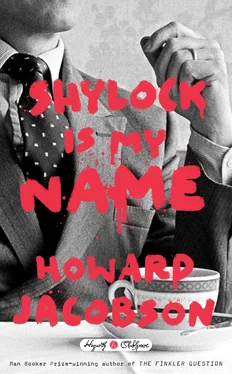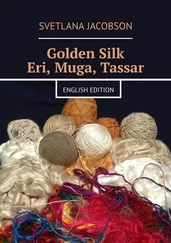“The world did . I doubt it has any more.”
“That’s as maybe. But the question has still to be asked. Would Abraham have gone on and killed his son?”
“Did Abraham ultimately have it in him to commit a murder? That too is an illegitimate line of enquiry.”
“Illegitimate or unanswerable?”
“Both. It’s the ‘ultimately’ we can’t know about.”
“So what is it legitimate to ask?”
“Whether anything in Abraham’s character until that point would lead one to think of him as a child killer.”
“The answer being no?”
“Exactly. No. And in mine neither. Was there anything in my personal history — mine specifically; mine as they knew of me, not mine as a member of a feared and hated race — to suggest I had a taste for blood? If there had been the slightest suspicion of such propensities the Gentiles would surely have kept their distance. But it was they who complained that I avoided them. Ask yourself this: would you agree a binding contract with a man who would cut your heart out if you reneged on it? Would you dare to steal from such a man? Take his jewels? Rob him of his daughter? Spit on him in the street? A man suspected of being free with his knife commands more respect than I did. More dread, too. Until I stood firm upon my bond they believed a few ducats’ reparation would quiet my temper. In their contempt and confidence you can discern my innocence of violent reputation.”
“They called you a cur and thought you wolfish.”
“They thought Jews wolfish — not me in particular, Jews —but in reality they barely believed their own libels. In the eyes of Christians and Muslims we have never been warlike enough. We are emasculated men who bleed like women. That’s what makes it so hard for them to forgive us when we do strike tellingly back. To lose to Jews is to lose to half-men.”
“Wasn’t there something of the warrior about Abraham?”
“Something, yes. But by the standards of the time he was a pussy cat.”
“So if he had so little violence in him, how do you understand his readiness to kill Isaac?”
“By not calling it a readiness. A particular precipitating circumstance led him so far on the road to murder, is all one can say. But did he have murder in his heart, even then? We cannot know. He did not know himself. The story stops, and will remain stopped for all eternity.”
“Abraham’s precipitating circumstance was God. What was yours?”
“The same.”
—
But Strulovitch couldn’t leave the matter alone. A chance comes along, you take it. And Shylock was looking more relaxed than he’d seen him, sitting in the half-dark with his legs outstretched, listening to the silence whenever Strulovitch allowed it to be silent. A man easy to ambush.
“Not for the first time,” Strulovitch resumed, “you elude my questions with the story stopping. Yes, the story stopped, but you haven’t. You are here. You have had time enough to reflect.”
“Reflect! I do nothing but reflect. But reflection is not action. It is not even knowledge of action. I don’t have the answer to your question. I don’t know if I would have gone ahead and taken flesh from around his heart — or, even, since you have asked me this before, how the heart suddenly became the site of my revenge.”
“Aha! You call it your revenge.”
“I do, and willingly. I had much to avenge. My daughter, my wealth, my reputation…”
“And a bloodthirst to slake?”
“Now you sound like them.”
“Then show me where I’m wrong. Do you wish you’d not been stopped?”
“Stopped?” Shylock narrowed his gaze. Suddenly he did not look as relaxed as he had been. “I wish, for all the good it does me, that I had not been thwarted .”
“From taking his heart?”
“From finding out whether or not I could have done it.”
“So you wish you had?”
“That is not quite the same thing. Had I done so they would not have hesitated to take mine.”
Strulovitch waved that consideration away. He wasn’t interested in consequences; he knew all about what they did to Jews; what intrigued him was what a Jew might do to them. “Let me trespass on your good nature one more time,” he pressed. “Would you have done it?”
“And one more time — I don’t know. I have no more taste for blood than you do. Those men, I mentioned, who faint during a bris— well I am one of them. Twice I’ve fainted. It was that or cry louder than the baby. Like you, I’m made of the softest stuff and equally hate the sight and smell and even thought of blood. But understand — my own blood was up. My hatred for that superior, all-suffering, all-sorrowing, sanctimonious man boiled in my veins. There was, I believed, as he no doubt believed of me, no room in this world for both of us. We denied each other. He could not allow me to transact my way and I could not allow him to transact his. I stood for order, he for chaos. We both, of necessity, dealt in obligation. To be in business imposes obligation. And to be a husband, a father, a lover, imposes obligation too. I dealt in true obligation — I gave and I took. A quid pro quo that was agreed to on all sides and left nothing to doubt or misunderstanding. He dealt in false obligation. He could bear only to give. He would not profit financially or emotionally. So he must always be sacrificial, disappointed and alone. Which imposed a hidden but constant obligation on those he gave to. I could not function in a universe as raw and haphazard as his. And he could not function in a world as rational as mine. My legalistic rigidity, as he considered it, cancelled him out. His emotional coercion cancelled me. Which is why one of us has always to kill the other. So yes, it’s possible — all right, more than possible — that in that fuming rage I would have found the wherewithal, the joy, the obligation — as though answering a commandment from a furious God — and as a long-owed return on those centuries of despising, as a requital of the slander, and as a perfectly ironic eventuation of all their baseless fears, yes, it’s more than possible that I’d have found what was necessary — call it the heroic strength, call it the bliss, call it if you will the villainousness — to take what by any reasonable computation was owing to me…I felt myself to be, I won’t pretend otherwise, the instrument of justice. By the measure I was used, would it be measured to them. And there’s no violence a man is not capable of when he believes he is acting as God would have him act. And before you say anything, I am as aware as you of the blasphemy of claiming such entitlement. Let’s include that, then, in what I might have been on the point of summoning up, the blasphemy of taking life, had it come to that, in God’s name, except that it didn’t come to that. So I am sorry, I cannot tell you what the act of murder feels like and whether, at the point of a knife, I would have gone ahead and done it. But I can tell you how it is to be brought to the threshold of murder and to wish, with every part of oneself that ministers to resolution, to cross over. Does that go any way to answering your question?”
But Strulovitch is asleep in his chair, worn out by too much anger and frustration, too much alcohol, and not impossibly too many questions.
Shylock, though, has another explanation.
This Strulovitch has a profound moral reluctance to stay awake, he thinks.
This Strulovitch asks but he doesn’t want to know the answer.
Jews are sentimental about themselves, and this Strulovitch, though he can’t decide if he’s a Jew or not, is no different. A Jew, by his understanding, is not capable of what non-Jews are capable of. A Jew does not take life. I am a hero to him by virtue of what I permitted to be done to me, not by what I did or might have done. Good Jew — kicked. Bad Jew — kicks.
Читать дальше












